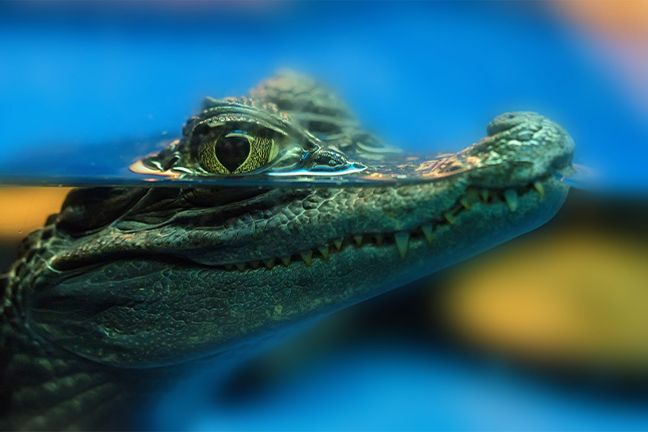Alligators are everywhere in Florida, lurking just below the water in rivers, streams, lakes, and ponds – even in retention ponds commonly found in community developments. Alligators over four feet pose a threat to people, pets, or property, and they can be designated a nuisance and removed by the Florida Fish and Wildlife Commission.[i] While these reptiles may be a nuisance, do they also pose a liability for Florida landowners and property management companies who ignore them or fail to have them removed? A recent case in St. Lucie County may provide guidance on dealing with these common Floridian creatures.
The Case of William Serge, as Personal Representative of the Estate of Gloria Serge v. Wynne Building Corporation d/b/a Spanish Lakes Fairways
In a recent case, William Serge sued, claiming alligators are in fact a “dangerous condition” which can result in death. Mr. Serge filed a lawsuit in January of 2024, alleging his mother, Gloria Serge, was killed by an alligator in the retention pond behind her home.[ii] According to the complaint, Wynne Building Corporation owned and operated Spanish Lakes Fairways, the housing development where Ms. Serge resided.[iii] While the homes in Spanish Lakes Fairways are privately owned, the land each home occupies and the common areas are owed by Wynne Building Corporation.[iv] Mr. Serge alleged two counts of wrongful death against Spanish Lakes Fairways, one alleging premises liability and the second alleging active negligence.
Mr. Serge asserts that, as the owner, manager and/or controller of Spanish Lakes Fairways, defendant had a non-delegable duty to take reasonable steps to eliminate dangerous conditions on the property (the alligator living in the retention pond behind Ms. Serge’s home) and to warn residents and invitees of the existence of the alligators and risks they posed.[v] Mr. Serge contends defendant knew or should have known about the dangerous alligators; however, he contends, defendant negligently failed to make arrangements for the trapping and removal of the alligators from the retention pond and failed to provide residents with any warnings regarding the alligators or their dangerous nature.[vi]
Mr. Serge also alleges Spanish Lakes Fairways was responsible for creating and enforcing rules and policies within the community and had a duty to act with reasonable care for the prevention of foreseeable harm to its residents and invitees.[vii] Mr. Serge claims his mother died as a direct and proximate result of Spanish Lakes Fairways’ breach of its duty of reasonable care.[viii] Further, Mr. Serge asserts defendant breached its duty of reasonable care when it allowed its employees, agents, and residents to feed the alligators, which substantially increased the likelihood of an alligator attack by normalizing human interaction and ensuring the alligators associated humans with food.[ix]
Further, Mr. Serge alleges Spanish Lakes Fairways downplayed the danger of the alligators by allowing residents to walk and fish along the shores the retention pond, allowing residents to maintain docks and watercraft on the retention pond, and encouraging residents to sit on the banks of the retention pond by its placement of benches.[x] Mr. Serge also contends Spanish Lakes Fairways’ pet policies forced Ms. Serge to walk her dog near the retention pond or at a communal dog run located more than a mile from her home.[xi]
Takeaway
Spanish Lakes Fairways has yet to file their response to Mr. Serge’s complaint, and while the facts of this case may seem unique, the outcome could potentially impact property owners across Florida. However, some guidance can be offered to Floridians who fear similar liabilities might be lurking below the water’s surface on their property.
First, do not feed the alligators. While we may not agree with Mr. Serge’s liability analysis, he is correct in saying that feeding alligators socializes them toward humans and teaches them to associate humans with food.[xii] It is also strictly prohibited by the Florida Fish and Wildlife Conservation Commission and can result in civil or criminal penalties.[xiii]
Second, if you are aware of alligators on your property, or property you control, discourage invitees from going near the alligators and consider posting signs warning of their presence and/or advising invitees not to feed them. Free sign templates can be found on the Florida Fish and Wildlife Conservation Commission website.[xiv]
Finally, if you cannot stop people from interacting with alligators on the property, considering calling the Florida Fish and Wildlife Conservation Commission’s Statewide Nuisance Alligator Program and requesting to have the alligators removed from the property.[xv]
Keep Reading
Sources
[i] Florida Fish and Wildlife Conservation Commission’s Statewide Nuisance Alligator Program, Statewide Nuisance Alligator Program | FWC (myfwc.com)
[ii] Plaintiff’s Complaint at ⁋15, William Serge as Personal Representative of the Estate of Gloria Serge v. Wynne Building Co. d/b/a Spanish Lakes Fairways, No. 56:2024-CA-000140 (St. Lucie County Circuit Court, January 25, 2024)
[iii] Id. at ⁋ 3 & ⁋ 7.
[iv] Id. at ⁋ 6.
[v] Id. at ⁋ 16.
[vi] Id. at ⁋ 17 & ⁋ 18.
[vii] Id. at ⁋ 23 & ⁋ 24.
[viii] Id. at ⁋ 30.
[ix] Id. at ⁋ 26.
[x] Id. at ⁋ 27.
[xi] Id. at ⁋ 28.
[xii] Florida Fish and Wildlife Conservation Commission’s Statewide Nuisance Alligator Program, Statewide Nuisance Alligator Program | FWC (myfwc.com)
[xiii] Id.
[xiv] Id.
[xv] Id.

 Author: BeJae Roberts
Author: BeJae Roberts
 Editor: Grace Shuman
Editor: Grace Shuman
 Fight Frivolous Filings! Use a CCP Section 128.7 Motion for Sanctions
Fight Frivolous Filings! Use a CCP Section 128.7 Motion for Sanctions
 Effective Closing Argument Strategies and Themes for Avoiding Nuclear Verdicts
Effective Closing Argument Strategies and Themes for Avoiding Nuclear Verdicts
 Immunizing Against Wrongful Termination Claims: How Pennsylvania Employers Can Avoid Costly Claims by At-Will Employees
Immunizing Against Wrongful Termination Claims: How Pennsylvania Employers Can Avoid Costly Claims by At-Will Employees
 A Seat at the Table: Supreme Court Rules Insurers Have a Right to Be “Heard on Any Issue” in Chapter 11 Cases
A Seat at the Table: Supreme Court Rules Insurers Have a Right to Be “Heard on Any Issue” in Chapter 11 Cases
 Kicked Off the Team: College Football Doctor Wins Big in Wrongful Termination Case
Kicked Off the Team: College Football Doctor Wins Big in Wrongful Termination Case
 Ten Easily Correctable Mistakes Made in Depositions
Ten Easily Correctable Mistakes Made in Depositions
 “Wrong Site” Surgery in Florida: Assessing the Viability of Punitive Damages
“Wrong Site” Surgery in Florida: Assessing the Viability of Punitive Damages
 Employing the Four Nuclear Verdicts® Defense Methods to Avoid Nuclear Verdicts and Runaway Juries
Employing the Four Nuclear Verdicts® Defense Methods to Avoid Nuclear Verdicts and Runaway Juries
 Breaking the Chains or Handing them the Keys? The Federal Trade Commission’s New Final Rule Regarding Non-Compete Agreements and Their Impact on Employers and Employees
Breaking the Chains or Handing them the Keys? The Federal Trade Commission’s New Final Rule Regarding Non-Compete Agreements and Their Impact on Employers and Employees